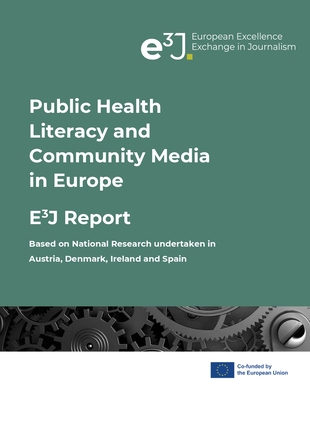Public Health Literacy and Community Media in Europe
Wenn es um Fragen rund um Public Health geht, besteht ein großer Bedarf an vertrauenswürdigen Informationen, sozialem Bewusstsein und Raum für Diskussionen. In ihrem Bericht "Public Health Literacy and Community Media in Europe" untersuchen CMFE und COMMIT die aktuellen Herausforderungen und Informationslücken für das Public-Health-Bewusstsein in Österreich, Dänemark, Irland und Spanien. Der Bericht untersucht die unterschiedlichen Rahmenbedingungen für die Arbeit der Community Medien, aber auch für die Kommunikationskultur und das Gesundheitsbewusstsein im Allgemeinen. Außerdem werden bewährte Verfahren für die Förderung eines Bewusstseins für Public Health ermittelt.
Public Health Literacy and Community Media in Europe
E3J Report
Based on National Research undertaken in Austria, Denmark, Ireland and Spain
Download (PDF)
This report was carried out within the framework of the project European Excellence Exchange in Journalism (E3J), a partnership among five European Press Freedom organisations. Recognizing that community media in many communities’ lives represent a trusted and valuable source of information, this thematic report aims to strengthen and support community media in reflecting and contributing to more public health awareness and debate. The report includes findings from four countries in Europe with different framework conditions for the work of community media, but also for communication culture and health awareness in general: Austria, Denmark, Ireland and Spain.
Community media are a tool of communication for people in hundreds of communities which are run for the community, about the community and by the community. They are recognised by European and International institutions and often referred to as the third media sector, as they serve as a distinct alternative to public national broadcasters and private commercial media.
Public Health is defined by the WHO as “the art and science of preventing disease, prolonging life and promoting health through the organized efforts of society” (Acheson, 1988; WHO). Public health encompasses much more than the goal of being healthy and refers also to external living conditions such as climate and clean environment, social aspects such as poverty reduction, comprehensive access to the health system for all but also the factual and evidence-based discussion of medical findings and ways to counter disinformation. As such it touches almost all of the 17 UN Sustainable Development Goals.
The report aims to find answers to the following questions based on research in four countries:
- What are the main challenges for more public health awareness in the involved countries?
- What are the major information gaps in the field of Public Health?
- What is community media’s role to inform and engage communities related to Public Health?
- What examples of good practise based on media and information literacy can be found to promote public health awareness?
Findings:
- When it comes to public health issues, there is a great need for more trustworthy information, social awareness and space for debate – this is true for all countries studied.
- Concern was found as to the inequal levels of health literacy in society, often closely linked to uneven levels of science literacy and in media and information literacy, but also dependent on available resources and social position in society.
- Community Media are relevant spaces for local or regional communication, trusted by the communities. This potential often cannot be fully developed due to limited resources. This fact prevents Community Media often to play an even more powerful role in informing communities about public health issues and to become stronger health literacy platforms.
- Community media are giving a voice to those segments of the communities with less opportunities to bring up their issues in mainstream media. By ensuring access for people with a wide fan of public health challenges and to take part in public debate about their health issues carries a high potential for raising awareness on public health and for encouraging more civic participation.
Recommendations:
- Community media can become key actors for health promotion and empowering people to increase their control over and improve their health. They are by their design and structure an important link between public health guidance and the community. Community media are acting locally and use horizontal structures of production. They allow people to create their own means of cultural expression, news, information and dialogue. Concrete actions should include:
- The production of live, magazine-format programmes, dealing with public health in all its variety and diversity should be based on involvement of or interviews with experts and ‘experts on consequences’ who live with the challenges.
- Involving and cooperating with medical, psychological, and social professionals in general could also open the way for new partnerships with connected or responsible institutions. This should include engagement with local associations, networks, action groups or the like to do portraits of these groupings to ease community engagement.
- The production of human-interest stories, personal portraits, where people who have gone through a health challenge describe it, talk about ways of living with it and the path to recovery can serve as good practise.
- Community Media should not limit their activities to programmes but also carry out community mobilisation and information-sharing events, workshops or other interventions in public spaces, physically, on-site.
- The production of short science information programmes, e.g. five minutes at a certain time every day, could be a helpful and effective form of public service announcements which might be realised also in different languages.
COMMIT Newsletter
14-tägig Updates erhalten
Aktuell
Ausschreibung: Geschäftsführung COMMIT (ab 1.9.2026)
Medien.Recht.Ethik: überarbeitete Neuauflage (2025)





